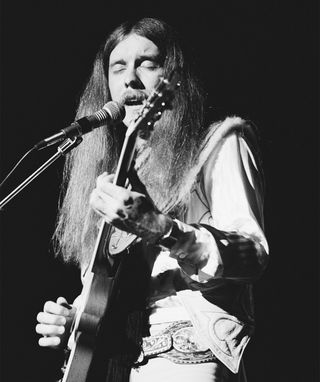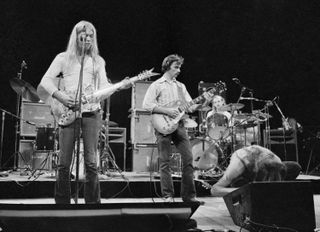“I’m the best unknown guitar player you’ve ever heard!” Les Dudek exclaims. While he may not be a household name, Dudek’s blues-infused guitar playing is certainly familiar to many. Over a five-decade career, he’s contributed guitar to recordings by artists like Steve Miller Band, Cher, Stevie Nicks, Boz Scaggs and the group that firmly established his six-string reputation, the Allman Brothers.
Dudek’s playing on the Allman Brothers staples “Ramblin’ Man” and “Jessica” tends to overshadow anything else the now 72-year-old guitarist has done, including his own solo outings. His contribution to those two time-honored Dickey Betts cuts — both of which were highlights of the group’s 1973 album, Brothers and Sisters — cannot be understated, since neither might have transpired if it hadn’t been for Dudek.
“I had been invited down to Capricorn Sound one night when the Allman Brothers were cutting ‘Ramblin’ Man,’ ” Dudek tells Guitar Playerreferring to the studio in Macon, Georgia where Brothers and Sisters was recorded. “I was in the control room when they were working it out. Periodically, Dickey would come up to me and ask what I thought about where this or that part of the song was going, so I gave him my suggestions.
“This kind of volleyed back and forth a few times before Dickey finally said, ‘Why don’t you just come out here and play it with me?’ So I went out there and helped put on the wall of electric guitars. We put two low and two high guitar parts on it so that it had some padding for the main guitar vamp.”

With the backing track completed, Dudek and Betts began working on the lead guitar parts. At Dudek’s suggestion, a guitar harmony was added. “The song starts off with that cascading phrase, and then I come in with a harmony part,” he explains. “We did that a few times in the song and at start of the solo.
“Then I made the suggestion of putting on another layer above that and have the drums kind of kick us into it. Later it branched out into a two-part harmony: a lower and a higher octave. It’s the same harmonies, but played in a different octave. Once that was done, Dickey put the slide part on for the final touch.”
Sometime later, Dudek received a call from Betts inviting him over to his house for dinner and instructing him to bring along his acoustic guitar. “While dinner was being cooked, Dickey showed me this rhythm part he had, what I would call the verse section of ‘Jessica,’ ” Dudek remembers. “And that’s all he had. He had writer’s block and didn’t know where to go with it. He didn’t have enough of it together that would allow us to go in and start developing it in the studio.
“So he got a little frustrated, but I stuck with it, and I came up with the bridge section that goes to the G chord. I said to Dickey, ‘Try this’ and showed him this little melody I had. As he was playing it, I said, ‘Take the melody all the way to the top.’
“So he went all the way to the top and said, ‘Now what?’ I said, ‘Stop.’ And he says, ‘Okay, now what?’
“I said, ‘Now start over.’ ”
“And that’s how it came out of the bridge section and back into the verse.
“Dickey lit up like a Christmas tree! We played it a few times, and he was like, ‘Yes!’ We finally got another part to add to it. So we took it into the studio and started working on it.”
While the recording session for “Ramblin’ Man” ran trouble free, the sessions for “Jessica” were problematic. “It took us about a week to cut that song,” Dudek says. “We just kept doing it every day until we finally got the one. In the middle of the week, Dickey and Gregg Allman also got into a verbal fight, which caused them to storm out of the studio, leaving us all sitting there going, ‘Now what?’
“At the start of the sessions, Dickey came up to me and said, ‘Look, you just played on ‘Ramblin’ Man’ and I really don’t want the critics to think you’re going to be in the band, so would you mind playing the acoustic guitar on this?’ I said, ‘No problem at all,’ because I figured I helped co-write it and I’m going to get a credit.”
Nevertheless, Dudek’s songwriting contributions were never acknowledged when the song was released or at anytime after.
“Once we got ‘Jessica’ recorded, Dickey took me into the office of Phil Walden, the manager of the Allman Brothers and the president of Capricorn Records,” Dudek explains. “Dickey told him he didn’t know what the split should be or anything, but that I was to get some writer’s royalties and writer’s credit for helping him come up with the bridge section to the song. But it never happened.”

Dudek doesn’t recall many details about the guitars used on “Jessica,” only that he played “an acoustic guitar that was lying around at the studio.” He has a better memory of the gear used on “Ramblin’ Man.”
“It was my ’68 goldtop Les Paul, the one that was on my first album cover, with the black pickups,” he says. “It was a guitar that my mom and dad had got me when I was 15. Amp-wise, I used a 100-watt Marshall half stack. Dickey had a couple of half stacks in the studio, so I used one, and we each had a cabinet. And Dickey used his sunburst Gibson Les Paul, too.”
Dudek confirms that in the aftermath of Duane Allman’s tragic death on October 29, 1971, there was a lot of pressure placed on Betts, who became the group’s default leader. “It was a major blow and just took the wind out of the band,” Dudek recalls. “Dickey didn’t know if the band was going to stay together or not. It was a really strange time because Duane had been gone only for a few months when I first came up there.
“Duane died at the end of October ‘71, and I was up there, around January, February of ’72. Dickey was already starting to look for players. He was going to put together his own band and continue on.
“Dickey basically wanted me to play in his band, and we were going to call it Great Southern. He already had that idea in his mind. But when Dickey finally started making moves to put it together, I think Gregg got a little bit annoyed by that.”
As a result, Dudek says, Great Southern was put on hold, at least for the time being.
“The Allman Brothers had band meetings and finally decided to try to make another record, which turned out to be the Brothers and Sisters album. And so Dickey’s band got put on the back burner. He did finally do it later, in 1974, but not with me. I had already moved to California by then.”
GIPHY App Key not set. Please check settings